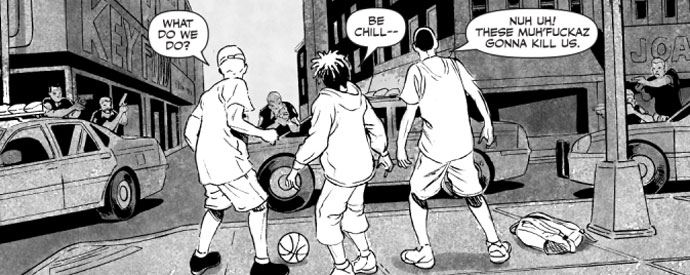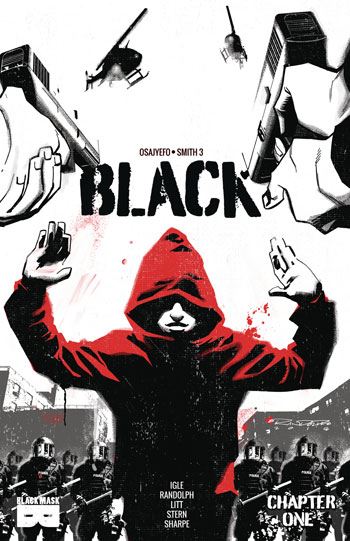Comics /
Comic Reviews /
More Comics
Black #1

By Hervé St-Louis
October 5, 2016 - 18:09
Black is the story of Kareem Jenkins, the only survivor of a premeditated and callous police shooting of three black youths. But Kareem possesses a particularity that only black people have. He has powers. He appears stronger and nearly indestructible. Bad people who want to control the power of Blacks are after him. But do they want to recruit, him exploit him, or eliminate him?
This comic was deemed very important by many because it was thought to reflect race relations in the United States between the Black community and authority figures like the police and the criminal justice system. So far, superficially Black is about police and authority brutality. It starts that way but the premise of the comic is a bit more complicated. Frankly, it felt like reading a comic that borrowed much from the X-Men and the first Matrix film.
Marvel’s mutants once used mutants as a decoy for Blacks in society. Black goes to the logical extent of this premise without the allegory. Without knowing exactly what the intentions of the villainous White people chasing Kareem, I bet that there will be echoes of White on Black exploitation in future issues of this comic book series. Now, the allegorical part comes with the parallels this comic has with the Matrix.
The world as its residents know it is not exactly as it is. Black recruits have to make quick decisions to join the resistance whose headquarter is called ‘the Project’. That line was quite funny when I read it. Kareem here has little personality. He jibes and is a kid. But his role is that of Neo from the Matrix. Through his eyes, readers discover the real power of Blacks.
And this is an important theme. As Jesse Williams argued at the 2016 BET awards, Blacks have special abilities, or powers that are often exploited by others. Their talents and labour is often exploited for the benefit of others than themselves. It is a genuine fear that Blacks have. The mythical figure that demonstrates this fear is the Haitian-Porto-Rican-American
artist Jean-Michel Basquiat whose paintings were exploited by Andy Warhol and many others. Basquiat died in poverty at a very young age, never fully enjoying the riches of his work.
The memory of slavery has made many American Blacks fear the exploitation of their brethren by Whites and others. This is one of the chief motivator of a series like Black and its creators. It is a statement about Black resistance and control over their creative output in comics. The closest parallel to the statement that Black pushes is that of the liberation of the popular comic book artists from the control of Marvel Comics in the 1990s that resulted in the creation of Image Comics.
At the same time, Dwayne McDuffie also led a movement for Black Comics that had the same affirmation goals, except he worked with Marvel’s opponent, DC Comics. Today, the Milestones Comics characters appear to be fully owned by DC Comics. Comics have seen a revitalization where the work of the creator can now be viable outside of the control of a large publisher. Image Comics has been leading this revolution. Except the creators of Black have eschewed Image Comics and argued, through Black, that they can promote the discovery of their own creativity.
Black is not as ground breaking as I thought it would be. The story is well told. There is a lot of suspense at the end of the first issue. Visually, it is more than competent. But Black is not about this. Black is about what can the Black creator achieve in the world of comic and a serious criticism and warning about the exploitation of the few Black creators that do work in mainstream comics. Most Black creators are shunned and not hired by mainstream comic publishers. I would argue that the problem is deeper than affirmation. Creators are not even given an opportunity.
I enjoyed Jamal Igle’s pages. They feel like classic comic pages and very in line with what one might expect from DC Comics. I was expecting something less prosaic, more urban. Igle is not that kind of creator. He sticks with classicism. This is interesting because the argument made by his very form and style is that Black and its founders can fully integrate the existing pantheon of comics creators and the established publishing ecosystem of the comic book market.
Rating: 8.5 /10
Last Updated: January 17, 2025 - 08:20

